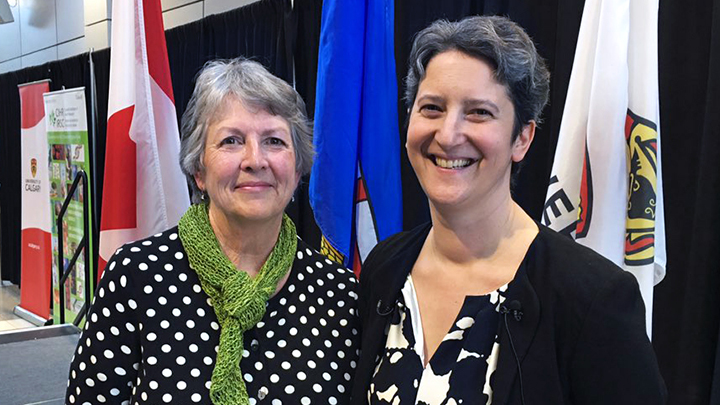
May 30, 2018

Alice Campbell, Patient/Family Advisor, poses with Dr. Jessica Simon, associate professor at the Cumming School of Medicine (CSM) and lead for the Palliative Care Early and Systematic (PaCES) Project, which aims to give patients living with advanced colorectal cancer access to palliative care support earlier in their illness.
Story by Kristin Whitworth & Pauline Zulueta | Photo courtesy of Lucas Meyer
Giving patients living with advanced colorectal cancer access to palliative care support earlier in their illness is one of the goals of the Palliative Care Early and Systematic (PaCES) Project. As well, PaCES aims to reduce gaps in coordinated care amongst various health care teams during their treatment.
“Patients have told us that the transition from care in a cancer centre to care at home is often quite stressful,” says Dr. Jessica Simon, Associate Professor at the Cumming School of Medicine (CSM) and lead for PaCES.
“We knew that in order to deliver an early and seamless palliative care pathway for patients, a lot of process changes in how we deliver healthcare would be required. So we looked for funding to help us fully understand the problems and then develop solutions to make care more continuous across our health care system.”
This past July, the project was awarded a nearly $1-million grant from the Canadian Institutes of Health Research (CIHR) with additional partnership funding from Alberta Health.
Researchers for the project include: Dr. Jessica Simon; and fellow co-leads Dr. Patricia Tang, Medical Oncologist, Tom Baker Cancer Centre, AHS; Dr. Aynharan Sinnarajah, Medical Director, Palliative/End of Life Care, AHS; Dr. Marc Kerba, Radiation Oncology, AHS; Dr. Sharon Watanabe, Director, Symptom Control and Palliative Care, AHS; and Dr. Amy Tan, Associate Professor, Department of Family Medicine, University of Calgary.
“Early palliative care is very much aligned with AHS’ current vision to bring care closer to the community,” says Dr. Sinnarajah. “It’s also patient/family-centred care at its core.”
Having early discussions about prognosis and future planning is another focus of the project. It’s not simply about more investment in community and palliative care services — it’s about bringing palliative care to the community earlier on, shifting care closer to home towards the last months of life, with less need for hospital care.
“Being proactive and talking about future planning and patient-centred decisions is hard in busy, clinical, day-to-day work by oncologists,” says Dr. Sinnarajah.
“Hence, it’s hard to quickly change that culture into being more proactive and aligning to what the patient wants. It’s a complex set of changes that this project is focusing on, changes that need to happen to bring palliative care to patients in their communities and bring it earlier on.”
To ensure PaCES is sustainable, the project team is working closely with existing AHS structures such as the Guideline Utilization Resource Unit (GURU), Patient Education, Tumor Councils, Cancer Control Alberta leadership, Professional education, Strategic Clinical Networks (Cancer, Primary Care Integration Network) and zonal and provincial palliative groups.
“If we get this right — and there are other projects doing this — we’ll be able to walk alongside our patients and families and deliver care that they want and in their home and community when they want,” says Dr. Sinnarajah.
“Focusing on quality of life alongside disease-oriented treatments is important. Spending time to ensure shared understanding of disease and treatment options is vital.”